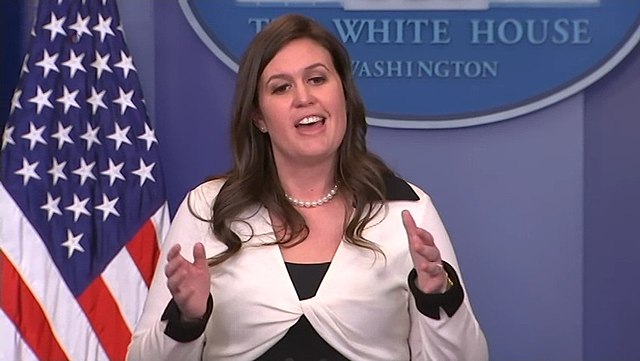
Sarah Huckabee Sanders. Image source: Wikimedia Commons
During her tenure as White House press secretary, Sarah Huckabee Sanders’ relationship with the media during her briefings has been less than cordial.
She has been accused of berating reporters, dodging questions, giving incomplete answers, calling printed stories and questions from the press “outrageous,” and accusing certain publications of promoting an anti-Trump agenda by deliberately printing unsubstantiated stories, even though the Mueller report showed that almost all the reporting was accurate.
Then on April 18, when the Mueller report became public, it was revealed that it wasn’t the press that was printing lies about president Trump. It was Sanders who told lies to the press.
The report revealed that Sanders saying she heard from “countless members of the FBI,” was not true. She also told Mueller investigators that saying that the rank-and-file FBI agents had lost confidence in former director James Comey was a figment of her imagination.
Weak Excuses for Lying
Her first comment, said Sanders, “was a slip of the tongue.” The second comment, she said, was made “in the heat of the moment.” In other words, she admitted lying to the press at least twice that we know of.
Sanders has said that President Trump has never told her to lie. Here’s the problem: When someone is caught in a lie, even if they subsequently tell the truth, there is good reason to believe that they are still lying, based, as they say at the race track or Wall Street, on past performances.
PR people do not have the best reputation for truthfulness with the general public and the media, our most important community. Over the years, journalists have accused PR people of acting like Ms. Sanders – protecting their clients by telling half-truths, misleading statements and outright lying.
In our business being caught lying to a reporter can have a devastating effect on a career.
Why PR People Should Never Lie
Here are nine reasons why PR people should never lie:
- If a reporter uncovers that you deliberately lied, there’s a good chance that the fact will be disclosed to the journalist’s colleagues and you will no longer be trusted as a credible information source.
- Once you lie to one reporter, you will have to repeat the same lie to all reporters.
- While lying on behalf of a client might be appreciated by your supervisors, if the lying is exposed, they’ll deny knowing about it.
- Even though you were asked to lie, the fact that you did might make you an untrustworthy employee and hinder your advancement.
- In some cases, disseminating false information can lead to prosecution and jail time.
- Lying to a reporter means that you’ll always worry if the untruth will come out.
- The lie you tell to a reporter might end up in an article, resulting in the need for a correction. In that case, you will lose the trust of both the client and the reporter.
- If a lie that you tell concerns a major entity and is exposed, the story will be reported, not as a correction hidden on page 33, but as an important story in major publications and TV newscasts. The revelation will embarrass your client, who might not know about your fib until contacted by a reporter. The news coverage will also embarrass your agency, which will certainly deny knowing you lied, and damage your reputation with friends.
- The Mueller report revealed that members of Trump’s team would not jeopardize themselves by lying for him. Don’t expect members of your account team or agency higher ups to protect you by lying, if your lie to the media is exposed. If you expect loyalty, bring your dog to work.
The End of Credibility
When Sarah Huckabee Sanders’ lies became public, it was reported for several days in press stories. Likewise when Hope Hicks told the House Intelligence Committee that she had told white lies on behalf of President Trump. Not receiving as much press coverage as Ms. Sanders and Ms. Hicks admissions was that Sean Spicer was also caught lying when he was the White House Press secretary. As a former reporter before jumping the fence to the public relations side, I believe their credibility as new sources is now zilch.
Experience shows that there are several ways to lose credibility with the media:
- Disseminating wrong information.
- Providing incomplete information.
- Being unresponsive.
- Acting as a gate keeper to client.
- And the fastest way: lying to a reporter and getting caught.
Lying to the media is never a good tactic. Just ask Ms. Sanders, Ms. Hicks and Mr. Spicer because whatever they tell the media will now be suspect.
Arthur Solomon, a former journalist, was a senior VP/senior counselor at Burson-Marsteller, and was responsible for restructuring, managing and playing key roles in significant national and international sports and non-sports programs. He now is a frequent contributor to public relations publications, consults on public relations projects and is on the Seoul Peace Prize nominating committee. He can be reached at arthursolomon4pr@juno.com or artsolomon4pr@optimum.net.



